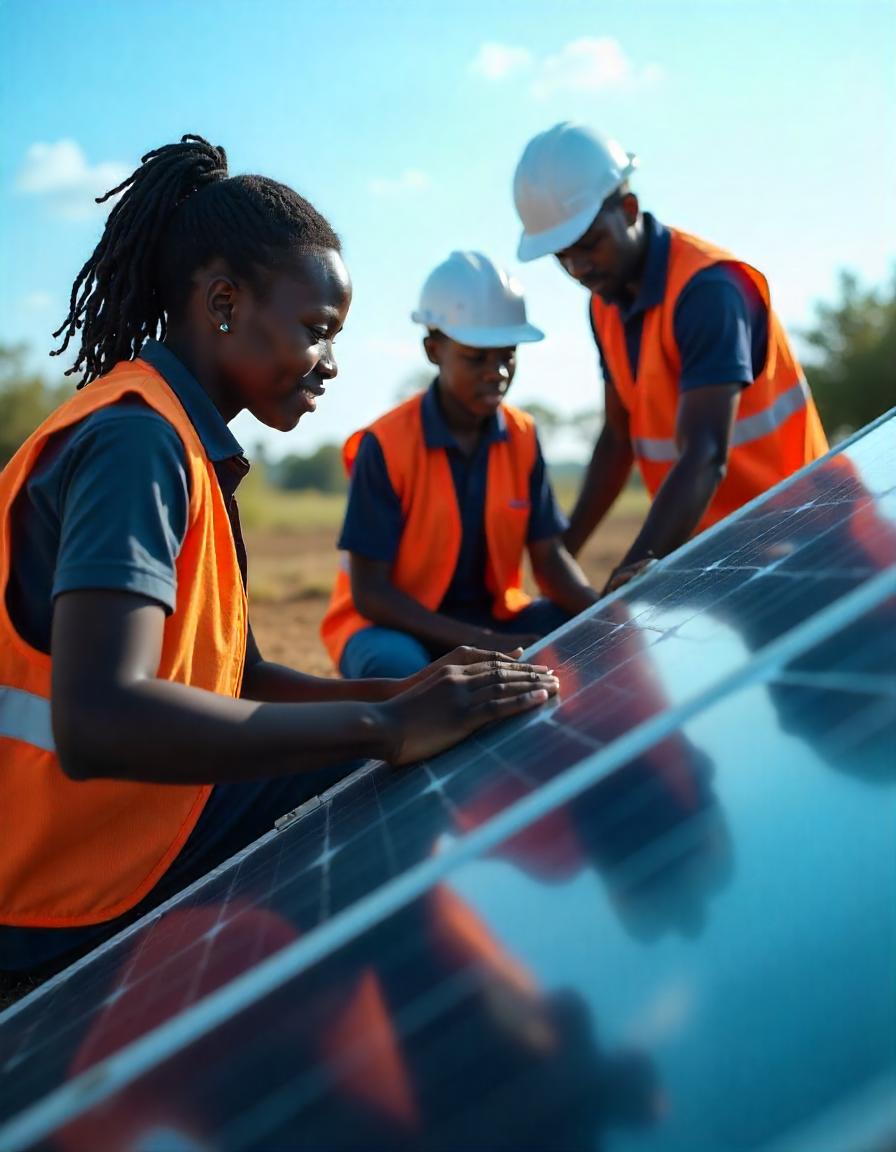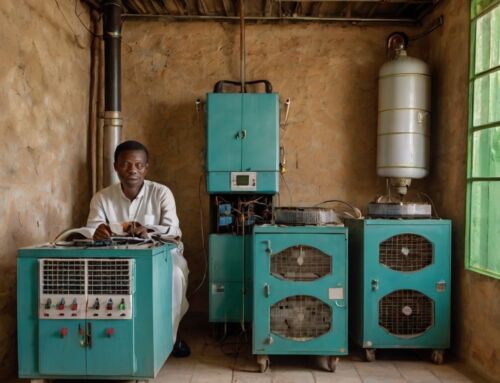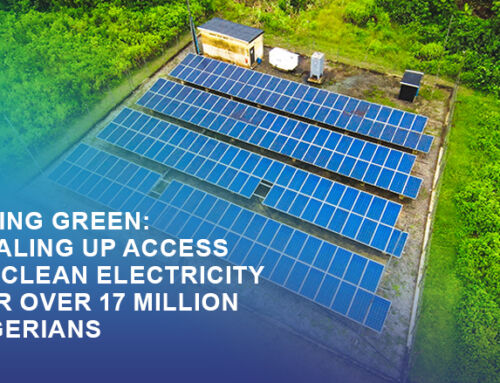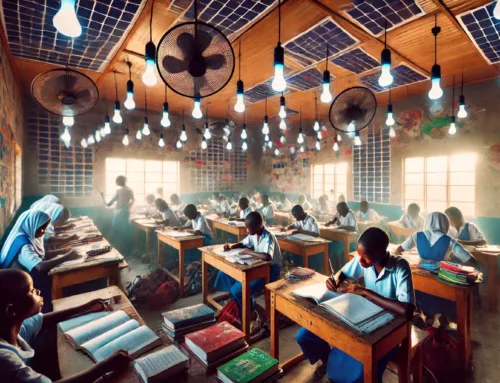Solar Energy in Nigeria as a Game-Changer
Solar energy is a beacon of hope for Nigeria. It tackles the country’s energy challenges. Nigeria gets over 2,000 hours of sunlight a year, making solar power a reliable source for homes, businesses, and industries.
Solar energy helps solve power shortages, boosts economic growth, and supports the environment. It improves energy access in both cities and rural areas.
Tackling Nigeria’s Power Supply Challenges
Nigeria’s electricity grid faces many issues. There are frequent outages and insufficient power. Many people use expensive, polluting diesel generators.
Grid Unreliability: Over 85 million Nigerians lack reliable electricity. Solar energy offers a solution for these areas.
Reducing Generator Dependence: Solar power is cheaper and cleaner than diesel generators. It’s great for small businesses.
Environmental Benefits: Solar energy is clean and helps fight climate change.
Environmental Benefits: A Cleaner Energy Future
Solar energy is clean and helps fight climate change.
Reducing Carbon Emissions : Nigeria is a big emitter of greenhouse gases. Solar power can cut down on this.
Eliminating Air and Noise Pollution: Diesel generators pollute the air and make noise. Solar systems are quiet and clean.
Boosting Economic Growth
Solar energy boosts Nigeria’s economy. It creates jobs and helps businesses grow.
Job Creation: Solar energy creates jobs in installation, maintenance, and manufacturing. Local people benefit from solar adoption.
Cost Savings for Businesses: Solar energy cuts down electricity costs. Businesses can save money and grow.
Empowering Rural Communities
Solar energy helps rural areas get electricity.
Off-Grid Solutions : Solar microgrids and systems bring power to rural areas. They power lighting, water, education, and healthcare.
Improved Quality of Life: Electricity lets children study at night. It powers businesses and supports farming, improving incomes and lives.
Supporting Energy Independence
Nigeria relies too much on imported fossil fuels. Solar energy helps make Nigeria more self-sufficient.
Reducing Fuel Imports: Solar energy reduces Nigeria’s need for imported fuel. This saves money and boosts energy security.
Decentralized Power Generation: Solar systems let people, businesses, and communities make their own power. This reduces dependence on the grid.
Enabling a Sustainable Energy Transition
Solar power is key to Nigeria’s green energy future.
Paris Agreement Commitments: Nigeria aims to cut greenhouse gas emissions and switch to clean energy. Solar energy helps meet these goals.
Scalability: Solar technology works for small homes and big farms. It meets Nigeria’s varied energy needs.
Solar Energy’s Role in Strengthening Nigeria’s Economy
Adding solar energy to Nigeria’s energy mix helps both people and the economy.
Reducing Energy Costs: Switching to solar power can save a lot on energy bills for homes and businesses.
Attracting Investments: Solar energy brings in money from both local and international investors. This helps grow Nigeria’s renewable energy market.
Solar energy is essential for Nigeria’s development, offering a sustainable solution to power shortages and high electricity costs. By tapping into abundant sunlight, Nigerians can achieve greater energy independence and reduce reliance on the unreliable national grid. Solar power also presents an opportunity to diversify Nigeria’s energy mix and reduce dependence on fossil fuels. With increased awareness and government incentives, adopting solar energy can drive economic growth, improve living standards, and reduce the environmental impact of traditional energy sources. As a growing renewable energy sector, solar energy is Nigeria’s key to a sustainable future
Conclusion: A Brighter Future with Solar Energy
Solar energy is key for Nigeria’s future. It solves the country’s power problems, cuts down on pollution, and helps rural areas. It also makes the economy grow.
For everyone, choosing solar power is a step towards a better future. Eco Solar (ecosolar.ng) is here to help Nigerians use the sun’s power. We offer solar panels, batteries, and systems that are reliable, affordable, and efficient. Let’s power Nigeria in a green way together.
Comprehensive FAQs on Solar Energy in Nigeria
1. What is solar energy, and how does it work?
Solar energy refers to the electricity generated from sunlight. Solar panels (USA Department of Energy), also known as photovoltaic (PV) cells, capture sunlight and convert it into usable electricity for homes, businesses, and industries (EnergySage). This renewable energy source is sustainable and eco-friendly.
2. Why is solar energy essential for Nigeria?
Solar energy is vital for Nigeria as it provides a clean, reliable, and cost-effective power solution. With over 2,000 hours of sunlight annually (REA), Nigeria has immense potential to address its electricity shortage, reduce dependence on fossil fuels (IRENA), and promote economic growth.
3. How does solar energy benefit the environment in Nigeria?
Solar energy significantly reduces carbon emissions and eliminates air and noise pollution. By switching to solar power, Nigeria can combat climate change, improve air quality, and preserve natural ecosystems.
4. Can solar energy improve rural development in Nigeria?
Absolutely! Solar energy is a game-changer for rural areas in Nigeria. Off-grid solar solutions, such as solar microgrids (Solar Sister) and home systems, provide electricity for lighting, clean water, education, and healthcare. This promotes social and economic development in underserved regions.
5. What are the economic advantages of using solar energy in Nigeria?
Solar energy boosts job creation in manufacturing (IRENA), installation, and maintenance. Businesses benefit from lower electricity bills, enabling them to save costs and scale operations. Additionally, the renewable energy sector attracts both local and foreign investment, driving economic growth (NSIA).
6. How does solar energy strengthen Nigeria’s energy independence?
Solar energy reduces Nigeria’s reliance on imported fuel and centralized power grids. By adopting solar systems, individuals, communities, and businesses can produce their electricity, enhancing energy security and reducing costs.
7. Is solar energy affordable for Nigerians?
Yes, solar energy is cost-effective over time. While the upfront cost for solar panels and batteries might seem high, the long-term savings on electricity bills and reduced generator expenses make solar an excellent investment for Nigerian homes and businesses (Solar Quotes).
8. How can solar energy help Nigeria achieve its climate goals?
As a signatory to the Paris Agreement, Nigeria aims to cut carbon emissions and adopt cleaner energy sources (UNFCCC). Scaling up solar energy use can significantly reduce greenhouse gases, helping Nigeria meet its climate commitments (Golbal Carbon Atlas) and transition to a green economy .
9. What are the challenges of adopting solar energy in Nigeria?
Adoption barriers include high initial costs, lack of awareness, and limited skilled labor. However, with increasing government incentives, private sector investments, and education campaigns, these challenges are being addressed.
10. Where can Nigerians find reliable solar energy solutions?
Nigerians can access high-quality solar energy solutions at Eco Solar. Eco Solar offers premium solar panels, batteries, and complete systems tailored to meet Nigeria’s energy needs affordably and efficiently.





